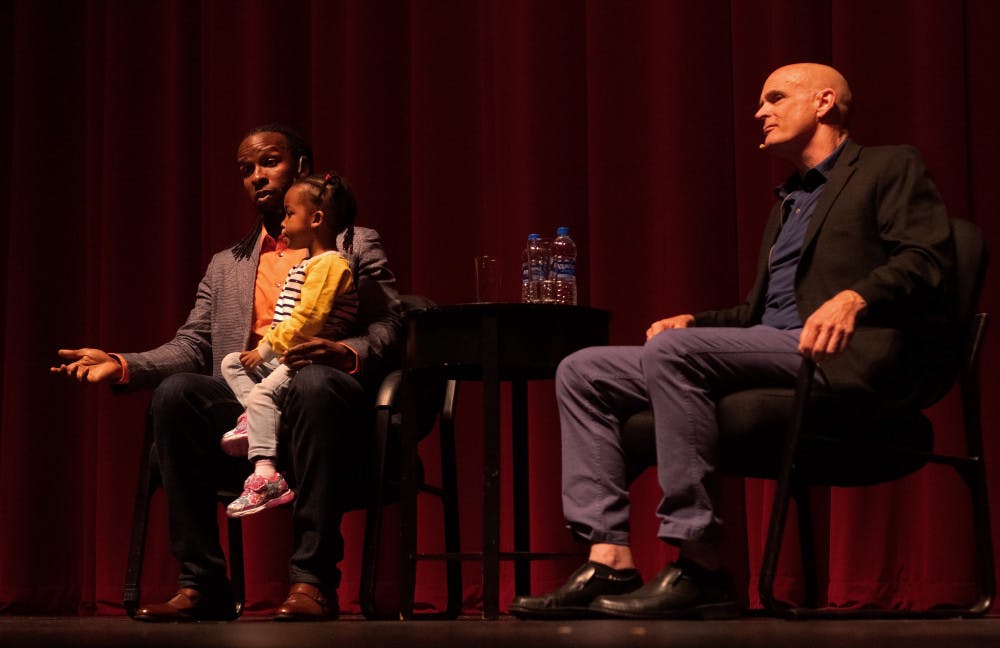Ibram X. Kendi spoke about dismantling oppressive systems, the role of the church in racism and teaching African American history in Alachua County Public Schools — all while holding his 3-year-old baby in his arms.
“Are we going to be on the side of struggling against racist policies, or are we going to be on the side of racism?” he asked.“Because there’s no in between.”

Eula L. Williams and Luester Ward read along from a page in Kendi’s book “How to Be an Antiracist” Thursday afternoon in the Alachua County Library District Headquarters in downtown Gainesville.
Nuclear war, climate change and bigotry are crippling the nation, Kendi said during his event at the Phillips Center for the Performing Arts Thursday night. His third novel, “How To Be an Antiracist,” was for sale and a signing event followed his speech.
Kendi addressed the crowd of about 1,230 people about how racist policies, which disproportionately affects communities of color, include things like like mass incarceration for nonviolent drug offenses and voter suppression.
Kendi, who was diagnosed with stage 4 colon cancer in January 2018, compared systemic racism to a tumor. He said two approaches exist to treating racism: either cutting out the figurative tumor, or flooding the body with antiracist policies.
“The person who does nothing in the face of a cancer… in the face of racism… what’s going to happen?” he said. “It’s only going to get worse.”

Ibram X. Kendi, author and former assistant professor of African American History at the University of Florida, speaks alongside Mayor Lauren Poe Thursday to an audience of about 250 people in the Alachua County Library District Headquarters in downtown Gainesville. Kendi spoke about racism throughout the country and answered questions from Mayor Poe and the audience.
Kendi’s visit to Gainesville was days after black female students were called racial slurs in a SNAP van.
In this case, the male student’s racism was passed down as learned behavior from parents or other sources, Kendi said.
Earlier in the day, Gainesville Mayor Lauren Poe and Kendi held an event at the Alachua County Library Headquarters Branch discussing his book. About 250 attended that event, where Kendi dove deeper into topics concerning Alachua County Public School’s achievement gap and how black individuals can be racist, even if the community is not.
He also spoke about the intersections of race, gender, sexuality, class and how U.S. history must be understood when talking about racism.

Ibram X. Kendi, author and former assistant professor of African American History at the University of Florida, speaks about his latest book, “How to Be an Antiracist”at the Phillips Center for the Performing Arts Thursday evening.
“People who are asserting this nation is post racial… what they are simultaneously saying is that the racial groups on the lower ends of the disparity… are on the end because they are inferior,” he said.
Kendi was a UF assistant professor of African American history from 2015 to 2017, said UF spokesperson Steve Orlando.
Raja Rahim, a UF history doctoral student, became Kendi’s mentee after she took his class in 2015. She said students can learn from Kendi about how racist ideas and policies have been used to divide rather than unify.
“This is one of the ways, not only black and brown, but all people can come together and reshift how they think about race,” she said.
Ibram X. Kendi answers an audience question during a question and answer session moderated by author and history professor Jack Davis while Kendi’s daughter sits in his lap at the Phillips Center for the Performing Arts Thursday night. About 1,230 people attended the event.






